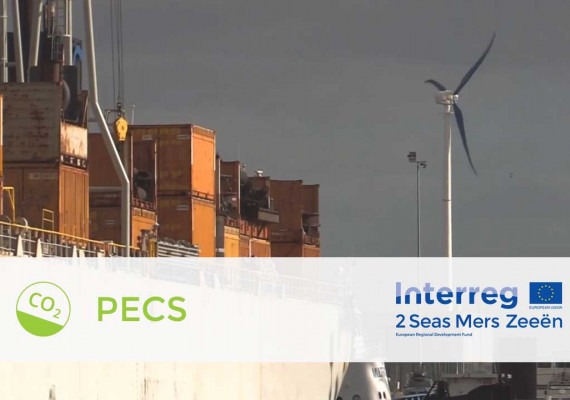PECS
Ports Energy and Carbon Savings
Priority Axis
Low Carbon TechnologiesSpecific objective
Low Carbon Technologies
Lead partner
Autonoom Gemeentebedrijf Haven OostendeContact
Begindatum
13/07/2017Einddatum
20/06/2021Project budget
8 070 649 €ERDF amount
3 981 011 €ERDF rate
49%Over
Common challenge
One of the major challenges for the 2 Seas area is to achieve carbon reductions through introduction of low carbon technologies (incl. renewables and energy efficiency). This project is addressing this challenge; in particular the application of such technologies in maritime operations within small and medium sized (SMS-)ports. These ports face numerous common obstacles (f.e. limited resources, technical expertise, lack of collaboration, regulations) and as a result little has been done to reduce carbon emissions. Demonstrations of low carbon technologies and solutions in real life and different circumstances are required to raise awareness and to show feasibility. In addition to convince other SMS-ports it is also necessary to develop and showcase practical methods and tools as energy audit, potentials for renewables and the best mix of low carbon options. Finally SMS-ports needs practical models for low carbon investment & business cases and to come to energy cooperation structures.
Overall objective
Main outputs
Cross border approach
Main Achievements
In this third year, due to COVID-19, PECS has made some, but not much progress in the achievement of outputs, communication (newsletters, social media, press releases, publications and presentations at events) and cross border cooperation.
All partners have submitted claims and achieved a total spending € 6.8 mio (approx. 84% of total budget). The little underspending is mainly due to COVID-19 and delays in the realisation of three pilots (O13-IndaChlor, O11-Port of Ostend and O8-Hellevoetsluis). In the first and third case problems with permits are the main cause, but for O13 this has been solved and for O8 partly. In the second case there were problems with design and tendering, but these are solved now. So the project will spend the whole (or almost) budget by the end of the project in 2021.
Although the project is behind schedule, most outputs are completed or almost completed. In WP1 (tools and methods), 4 of the 5 outputs are ready, and for the last one, O4, a draft version is ready. In WP2, one output (O6-overall verification study) has been completed and the second one (O7-overall testing and monitoring report) is half way and will be completed in March
Also 6 out of 8 pilots are ready: Wind turbine in Ostend, Linkspan in Portsmouth, Floating Solar panels in Hellevoetsluis, LEM-Platform in OD IJmond The Small wind turbines in Hellevoetsluis and the Energy pontoon of BPS. The first 4 are also tested and monitored, the last 2 are now being tested. The 2 other pilots (O11 and O13) have some delays and will be completed in 2021 (at the latest in June).
Regarding specific objectives and results good results can been reported for 3 pilots, only the Medium sized wind turbine has less results than expected. For the tools/methods which are ready we don’t yet know how much they are used by others. This will be investigated by a survey which will be executed in January-March 2021.
Cross-border cooperation proceeds well. Knowledge partners have collaborated on development of methods and port partners contributed by testing’s. In the other way around, knowledge partners have supported pilot partners with their investments (monitoring). Collaboration is also good with regard to management and communication.


